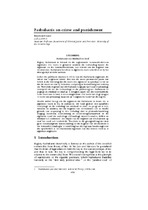| dc.description.abstract | Evgeny Pashukanis deservedly is famous as the author of the so-called
commodity form theory of law. In his Law and Marxism he postulated
that the form of legal relations held the key to the Marxist critique of law
and that, in turn, the key to comprehending the legal form lay in its
relation to the commodity form. The crucial concept here is the principle
of equivalence or the equality postulate, which Pashukanis classifies
variously as the “first truly juridical idea”1 or the “juridical soul” of
criminal proceedings. Just as commodity exchange pivots upon mutual
recognition by commodity owners of one another as equals, so legal
exchange stipulates reciprocal acceptance by legal subjects of one
another as compeers. Indeed, juridification is the alter ego of
commodification, in that the evolution of the legal form tracks the
evolution of the commodity form. In a word, Pashukanis theorised the
legal form as the homologue of the commodity form, with both delimited
in terms of the principle of equivalence.
Pashukanis made it clear always that the historical genesis of his
general theory lay in private law, specifically the law of contract. It is the
branch of law which is both the historical and logical repository of the
notion of equivalence.3 By contrast, criminal justice appears to be far
removed from the commodity form and the idea of equivalence. This
article investigates the relationship between Pashukanism and criminal
justice, attempting to prove that the private law derivation of the
commodity form theory does not preclude its extrapolation to public law
in general and to criminal law in particular. It seeks to convince that the
disjunction between Pashukanism and criminal justice is more apparent
than real. Pashukanis formulated the commodity form theory as a
general theory of law, and the argument herein thus may be read as a
defence of that generality. | en_US |

